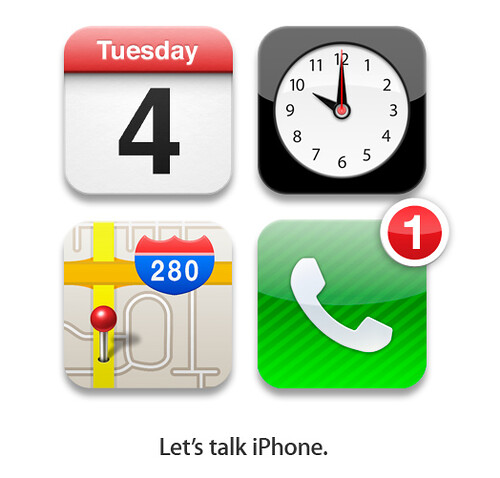It’s that time of the year again. There’s an Apple keynote today, which means that every writer covering Apple has been busy over the last few weeks, making predictions and analyses about what we’re likely going to see. I don’t normally engage in that game, but this year I will be following the keynote with special interest, so I thought I would make an exception and join in the fun.

Here it goes. My first prediction is this: by the end of the day, my wallet will be thinner and lighter. A few hundred bucks lighter, to be precise.
Let me elaborate: I’ve been a happy-but-seriously-frustrated-as-of-late owner of an iPhone 3G since its release, back in 2008. I got it on day one. That was the first iPhone to be released in Spain, which means that so far I’ve only owned one iPhone. For me there have been no multi-tasking, no compass, no AirPlay, no fancy iOS 4.3 features. None. The phone itself works great, and the battery still lasts almost two days, but the whole thing has been slowed down to a crawl with the last few software updates, ever since iOS 4.0 and up to iOS 4.2.1. How Apple allowed those updates to be installed on this device, I will never know.
The point is I’m clearly due for an upgrade, so I’m the ideal audience for today’s keynote. They would have to seriously screw things up for me not to buy the next iPhone as soon as I can get my hands on it. And even then, I would probably just buy an iPhone 4 instead. But I digress.
What we (don’t) know
There has been much talk and the usual crazy rumors about the next iPhone: some purported leaks, some mysterious sources “close to the matter” and even a lost prototype that nobody saw, but for the most part we all remain in the dark about how it will look like, its new features, etc. We don’t even know if there will be more than one new iPhone. iPhone 4S? iPhone 5? No clue. Bigger screen? I doubt it. It’s remarkable how Apple has been able to keep everything under control this time around.
There are several points of agreement among the different rumors: pretty much everyone believes that the new iPhone will be built around Apple’s A5 chip, the one that debuted in the iPad 2. There is also a general consensus that it will probably be thinner and lighter, and possibly with an aluminum back. My opinion is that the A5 is a sure thing, but that’s about as much as we can say with some degree of certainty. So instead of speculating about it, I will focus on the rest of Apple’s product line and analyze how today’s event might affect each one of them, individually. Take these predictions with a grain of salt.
The Apple TV
First, let’s state the obvious: there will be a new Apple TV today, and it will include the A5 chip. It seems appropriate that Apple will use this event to present all of their next-generation iOS devices, not just the new iPhone (except for the iPad 3, which we won’t see until early 2012). The A5 is a sure bet for the new Apple TV because it enables the one feature that was sorely missing from last year’s version: Full 1080p hardware video decoding. If you ask me, that’s more than enough to justify a new Apple TV. Whether it will get more new features, I don’t know. Definitely iCloud integration, and it will probably run iOS 5, but other than that it’s a mystery. Apps? I don’t think so, but it’s certainly possible. We’ll see. In any case, the price stays at $99.
The iPod family
This is where things get tricky. Will this event also affect the iPod line? If so, what’s going to happen to them? Will they be old history after today? I don’t think they will eliminate the whole lineup, but something tells me there will be blood. Remember, this is Apple. They have a knack for terminating successful product lines well before their commercial demise. It’s still a pretty big part of their business, but it’s been heavily dominated by the iPod touch lately, which is really much closer to an iPhone that an iPod if you think about it.
I could imagine the following scenario: The iPod nano and the iPod shuffle merge into one unique product. Call it whatever you want. I believe it will have a storage capacity between 4-8GB, definitely with physical buttons, and with a basic display. Gone is the 2” touchscreen. It looked really nice and I was very excited about it, but then I bought one and it was a pain to use when jogging, and pretty much always. If I had to guess a price point, I believe $99 is the sweet spot for an 8GB model, and probably $59 for a 4GB model.
Then there’s the iPod touch. Call me crazy, but I think they’re killing it. It makes so much sense. Why do people love the iPod touch? Because it’s an iPhone without the phone. Or, more precisely, an iPhone without a 2-year contract and a $100 monthly bill. But what if Apple were to release a new, prepaid iPhone instead of a new iPod touch? Then the whole contract problem goes away immediately. Who wouldn’t want such a device? Besides, it would help Apple in the market share statistics against Android, because as of today, iPod touches don’t count. And they have sold a gazillion of them. If all those were iPhones, maybe Android wouldn’t be looking as dominant as it does today. Remember, this is a public perception battle as much as it is an economic one. Apple is beating the heck out of everybody else in the economic front, but such a move would help them in the other front, too.
This is just nitpicking, of course, but after seeing the invitation: “Let’s talk iPhone” I kind of feel they’re hinting at it. Surely any new features that may be included in the new iPhone would also find their way into a hypothetical new iPod touch, so why leave it out? Why not “Let’s talk iOS”? Or something else, less explicit, to make room for more devices? Nope. They’re just talking iPhone, maybe because after today it’s all about the iPhone, and there’s no new iPod touch. To me it seems clear: Apple needs a low-end iPhone, and the only way to do that without confusing people is to kill the iPod touch.
And what about the iPod classic? Well, I believe they’re killing it, too. Or at least they’re forgetting about it: no upgrades, same price, until everybody forgets it ever existed. Marco Arment has a good theory about why that makes sense, and I agree with him. Its role in the lineup is confusing, it’s more than ever a niche product, and its days of glory are way behind us.
The new iPhone(s)
My money is on a brand new top-of-the-line iPhone, probably called iPhone 5, with the same current pricing structure: $199 / $299 with a 2-year contract, or $649 / $749 contract-free and carrier unlocked. Maybe the unlocked iPhone will see its price cut down to $599 / $699. Storage-wise, I’m not sure we will see any changes, after all iCloud will significantly reduce the need for on-device storage of most iPhone users, so 32 GB seems plenty. However, a 64GB version is not totally out of the picture.
Then, a lower-end iPhone, still on-par or slightly better than the current iPhone 4. I don’t like the name iPhone 4S. This one will be sold at the price of the current higher end iPod touch models: $299 / $399, but for 16 / 32 GB versions instead of 32 / 64GB. The message is clear: sacrifice some storage, get a built-in phone instead. This one doesn’t get the 64GB version. It will be sold without a contract, and carrier unlocked. Maybe they’ll announce some deals with the carriers to provide voice + data plans at an affordable pay-as-you-go price, like they did with the iPad 3G.
The presenter(s)
The only thing missing from the picture is the actual presenter: who will take the stage to unveil the new stuff? There have been reports that it will be Tim Cook, and if we take the past as reference, it certainly seems logical. However, I haven’t ruled out a Steve Jobs appearance. Maybe a brief one, introducing the general ideas, and then leaving it up to other team members to walk the audience through the technical details. That was the arrangement on the past couple of keynotes, and it works. I agree with John Gruber, I don’t think Jobs gave all these keynotes in the past because he was the CEO. He gave them because he was the best presenter in the company, and he still is. If he’s healthy enough, why not have him do it? After all, he was on medical leave during WWDC, and that didn’t stop him from taking the stage. I realize this is a long shot, but I would really like to see him up there.
The take-away
That’s all I got. If I were to nail all of these predictions (and none of them seem too far fetched), the resulting product line would be a lot cleaner and more appealing in my opinion. There would be a very clear distinction between the different product ranges, and all of them would have a specific, well-defined role (iPods for music, iPhones for everything else). Besides, it would be a lot easier for Apple to manage the different iOS branches going forward, since they wouldn’t need to support a dedicated iOS version for the iPod touch anymore.
Anyway, we are just a few short hours away from finding out. Whatever they end up announcing, one thing is certain: we will all be watching closely. Some people will love it, others will hate it, but everyone will care. Everything we say or write about it will only be because we care. That’s a critical battle Apple has already won.


